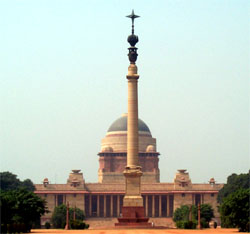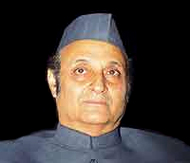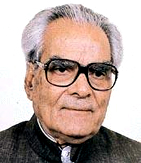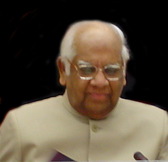Apr 18, 2024
Apr 18, 2024
 The elections for selecting the next President of India are due in the middle of next year but the race of the contenders has already begun. There are many names being thrown up in the media but as of now there seem to be three main contenders. They are the incumbent Vice President of India, Bhairon Singh Shekhawat: then Dr. Karan Singh and lastly the Communist candidate Shri Som Nath Chatterji who is currently the Speaker of India's Lower House of Parliament, the Lok Sabha.
The elections for selecting the next President of India are due in the middle of next year but the race of the contenders has already begun. There are many names being thrown up in the media but as of now there seem to be three main contenders. They are the incumbent Vice President of India, Bhairon Singh Shekhawat: then Dr. Karan Singh and lastly the Communist candidate Shri Som Nath Chatterji who is currently the Speaker of India's Lower House of Parliament, the Lok Sabha.
The President of India is normally viewed as the ceremonial Head of State with the real executive powers exercised by the Council of Ministers headed by the Prime Minister of India. He is also the Supreme Commander of India's Armed Forces. But in my view his most important constitutional role assigned in the Constitution of India is to ' Protect, Preserve and Defend the Constitution of India'.
This role assumes greater significance in today's political milieu when no political party is able to get decisive majority in national elections and political parties try to cobble up unholy political coalitions and lay claims to form the Government. At times they fudge the coalition electoral arithmetic in term of numbers who support them to convince the President that they should be invited to form the Government. In the process moral and political ethics are thrown to the winds and India is made to lump Governments with tainted Ministers and individuals with corruption charges against them are allowed to flee from the clutches of India's judicious processes. India's fragmented electoral verdicts are likely to persist for a long time to come with more confounding electoral verdicts.
In such confusing and confounded political scenarios the role of the President of India is likely to emerge as more challenging. Increasingly, to retrieve India from the morass of political chicanery the future Presidents of India will really have to actively assert their roles of : 'Protect, Preserve and Defend the Constitution of India'. This may involve even in their discretion ignoring the advice of the Council of Ministers. The Founding Fathers of our Constitution intended the President of India to provide the 'checks and balances' to any political waywardness of the Government of the day as it happened in the declaration of Emergency by the Indira Gandhi Government where President Ahmad meekly went along with the Prime Minister to hang on to office after being unseated by the Allahabad High Court.
The President of India like the Supreme Court of India has to increasingly become an 'activist and assertive President' if the Constitution of India is to be protected, preserved and defended against the forays of political parties intent on subverting the system for their narrow political gains.
India therefore needs Presidents of intellectual stature, impeccable integrity and dignity who naturally command respect on the standing of their personal attainments and enthuse confidence in India-at-large that the Constitution that they gave to themselves is in safe custodial hands. Besides, India's external image and respect from the international community gets personified in the personage of the President of India more than the Prime Minister of India.
The first three Presidents of India--- Dr. Rajendra Prasad, Dr. Radhakrishnan and Dr. Zakir Hussain were men of intellect, learning and India was proud of them for what they brought to their office and its dignity. Thereafter, the Presidents that came until President Kalam were outright common politicians with no towering intellectual attainments or the dignity that marked the first three and the present one. Even the Late Dr. Naraynan as President did not cover himself with glory despite his intellectual attainments. He at a crucial moment let his political inclinations get the better of his august office.
 Coming to the contenders that are now said to be in the run for the office of the President of India Dr. Karan Singh stands out toweringly above the others in terms of personal attainments in the intellectual field, the social and cultural fields and in terms of diverse and many splendored exposures. His personal integrity has been beyond reproach and he commands wide respect in all sections of India which cannot be said of the political party that he belongs to. Therein lies his strength.
Coming to the contenders that are now said to be in the run for the office of the President of India Dr. Karan Singh stands out toweringly above the others in terms of personal attainments in the intellectual field, the social and cultural fields and in terms of diverse and many splendored exposures. His personal integrity has been beyond reproach and he commands wide respect in all sections of India which cannot be said of the political party that he belongs to. Therein lies his strength.
 The Vice President of India, Shri Shekhawat is a seasoned politician who had distinguished himself in his political career with the Bharatiya Janata Party and won respect in his dignified conduct of the Rajya Sabha proceedings.
The Vice President of India, Shri Shekhawat is a seasoned politician who had distinguished himself in his political career with the Bharatiya Janata Party and won respect in his dignified conduct of the Rajya Sabha proceedings.
 The Communist Party candidate Shri Som Nath Chatterji is also a seasoned politician with long years of experience in the Lok Sabha. As the Lok Sabha Speaker, however, he stands criticized by other political parties of bias in the conduct of Lok Sabha proceedings. More than any other Lok Sabha Speaker, on many issues he was on a collision course with the judiciary on constitutional issues. On the Office of Profit issue also there were some media commentaries that suggested that since he was personally involved in the issue he should have not presided until the issue was solved. The reason being speculated for the Communist Party putting up a Presidential candidate is that they feel that by placing a Communist in the President's office the Communist Parties would find greater acceptance amongst India's growing middle class. This is a misperception as India's middle class would not accept the Communist Parties as a viable political alternative until they stop looking at Beijing for policy guidance and advancing China's interests in India.
The Communist Party candidate Shri Som Nath Chatterji is also a seasoned politician with long years of experience in the Lok Sabha. As the Lok Sabha Speaker, however, he stands criticized by other political parties of bias in the conduct of Lok Sabha proceedings. More than any other Lok Sabha Speaker, on many issues he was on a collision course with the judiciary on constitutional issues. On the Office of Profit issue also there were some media commentaries that suggested that since he was personally involved in the issue he should have not presided until the issue was solved. The reason being speculated for the Communist Party putting up a Presidential candidate is that they feel that by placing a Communist in the President's office the Communist Parties would find greater acceptance amongst India's growing middle class. This is a misperception as India's middle class would not accept the Communist Parties as a viable political alternative until they stop looking at Beijing for policy guidance and advancing China's interests in India.
India-at-large would expect from its political parties that for once they would put their political chicanery aside and so also their narrow political considerations and elect the best man as the President of India. Dr. Karan Singh stands out distinctively as the best presidential candidate and would bring luster and dignity to the august office of the President of India. He can also be expected to rise above his political party linkages and reach out widely to India-at-large and the entire political spectrum.
22-Oct-2006
More by : Dr. Subhash Kapila